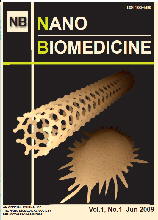
Nano Biomedicine
ORIGINAL ARTICLE
NOD2 Regulates the Production of MMP-3 in Human Deciduous Dental Pulp Fibroblast-like Cells
Masae OKUNO1, Kyoko HARADA2, Hiroshi INOUE3, Hidetoshi MOROTO4, Haonan ZHANG4,
Ruixuan ZHANG5, Meili MU5, Chikako HOSOYAMA6, Yukiko HOSOYAMA6, Akito FUKAWA7,
Wakana SUGIMOTO7, Naoyuki MATSUMOTO6, Kazuyo YAMAMOTO8, and Seiji GODA3
1Graduate School of Dentistry, Department of Pediatric Dentistry,
2Department of Pediatric Dentistry, 3Department of Physiology, 4Graduate School of Dentistry, Department of Operative Dentistry,
5Graduate School of Dentistry, Department of Physiology, 6Department of Orthodontics, 7Graduate School of Dentistry, Department of Orthodontics,
8Department of Operative Dentistry, Osaka Dental University, Osaka, Japan
Nano Biomed 2021; 13(2):41-48, (Dec 30, Nano Biomedicine)
Synopsis
Nucleotide-binding oligomerization domain 2 (NOD2), which is constitutively expressed in human pulp fibroblasts, plays a role in pulpal immune responses by sensing muramyl dipeptide (MDP) from bacteria, which leads to pulpitis. Matrix metalloproteinase-3 (MMP-3), which exhibits broad substrate specificity to the extracellular matrix (ECM) and induces angiogenesis and fibroblast wound healing, is expressed when pulp is inflamed. In the present study, we examined MDP/NOD2-induced MMP-3 production and the role of its signaling cascade involving TAK1/MAP kinase in human deciduous dental pulp fibroblast-like cells (hDDPFs). MDP did not affect the proliferation or viability of hDDPFs. The MAP kinase signaling pathway was involved in the production of MMP-3 in MDP-stimulated hDDPFs. The MDP stimulation enhanced ERK 1/2 phosphorylation, but did not affect the degradation of IκB. These results suggest that the production of MMP-3 in MDP-stimulated hDDPFs stimulated the degradation of surrounding collagen, leading to alterations in the structure of the ECM and inflammation, and appeared to promote angiogenesis.
Key words: NOD2/MDP, MMP-3, MAP kinase, human deciduous dental pulp fibroblast-like cells
All documents in this paper (Free)
J-Stage https://www.jstage.jst.go.jp/article/nano/13/2/13_13_41/_article
DOI https://doi.org/10.11344/nano.13.41
Nucleotide-binding oligomerization domain 2 (NOD2), which is constitutively expressed in human pulp fibroblasts, plays a role in pulpal immune responses by sensing muramyl dipeptide (MDP) from bacteria, which leads to pulpitis. Matrix metalloproteinase-3 (MMP-3), which exhibits broad substrate specificity to the extracellular matrix (ECM) and induces angiogenesis and fibroblast wound healing, is expressed when pulp is inflamed. In the present study, we examined MDP/NOD2-induced MMP-3 production and the role of its signaling cascade involving TAK1/MAP kinase in human deciduous dental pulp fibroblast-like cells (hDDPFs). MDP did not affect the proliferation or viability of hDDPFs. The MAP kinase signaling pathway was involved in the production of MMP-3 in MDP-stimulated hDDPFs. The MDP stimulation enhanced ERK 1/2 phosphorylation, but did not affect the degradation of IκB. These results suggest that the production of MMP-3 in MDP-stimulated hDDPFs stimulated the degradation of surrounding collagen, leading to alterations in the structure of the ECM and inflammation, and appeared to promote angiogenesis.
Key words: NOD2/MDP, MMP-3, MAP kinase, human deciduous dental pulp fibroblast-like cells
All documents in this paper (Free)
J-Stage https://www.jstage.jst.go.jp/article/nano/13/2/13_13_41/_article
DOI https://doi.org/10.11344/nano.13.41